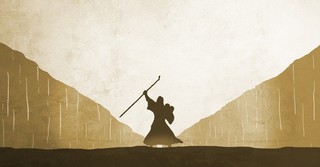4 Heroes of the Bible Who Feared They Weren't Good Enough
Share

Has God called you to something daunting? Do you feel as if you cannot complete the task he has sent you to do. Fear not! We have loads of examples from the Bible of heroes who feared they didn't have what it took to face giants. Let's look at four examples of these heroes of the faith and apply the lessons learned to our own lives when it comes to the tasks that God has set before us.
Photo credit: ©Getty Images/TeamDAF
1. Isaiah

“Woe to me! I am ruined! For I am a man of unclean lips, and I live among a people of unclean lips, and my eyes have seen the King, the Lord Almighty!” (Is. 6:5).
Many of us know about Isaiah. He has a book in the Major Prophets section of the Bible (prophets who had longer books) and he existed during one of the greatest times of upheaval in Israel. His name lives on in the christenings of children today.
But when we first meet him, and he encounters God and the angels, his knees buckle. He doesn’t feel up to the task.
As we witness in the passage above, Isaiah knows that he has not come close to perfection. Sure, he may not have stumbled as badly as Israel’s kings (at least, we should hope that Isaiah never offered any of his children as a sacrifice to Molech), but Isaiah recognizes that he doesn’t have what it takes for what God is calling him to do, especially because of his sin.
He worries about serving as Israel’s mouthpiece because of his unclean lips. One of the angels places a burning coal to Isaiah’s lips, a cleansing of sorts, then he says this.
“See, this has touched your lips; your guilt is taken away and your sin atoned for” (Is. 6:7).
God recognizes that Isaiah has unclean lips, but this doesn’t prevent God from setting him forth on the task. Through Isaiah, we learn that we need to come to the Lord in repentance, especially when God calls us to something far greater than ourselves.
Photo credit: ©Getty Images/Uwe Moser
2. Moses

“Moses said to the Lord, ‘Pardon your servant, Lord. I have never been eloquent, neither in the past nor since you have spoken to your servant. I am slow of speech and tongue.’
The Lord said to him, ‘Who gave human beings their mouths? Who makes them deaf or mute? Who gives them sight or makes them blind? Is it not I, the Lord? Now go; I will help you speak and will teach you what to say.’
But Moses said, ‘Pardon your servant, Lord. Please send someone else’” (Ex. 4:10-13).
Moses and God go toe-to-toe in the desert. After Moses had been raised in Pharaoh’s household during a time where the Pharaoh killed all the male infants, he ends up murdering an Egyptian taskmaster who treats a Hebrew slave poorly. For fear of his life, Moses flees to the desert and lives there for decades.
God appears to Moses out there in the form of a burning bush and asks him to go to Egypt to tell Pharaoh to set his people free. By this point, the Pharaoh in power during Moses’ childhood likely had died. But this doesn’t really comfort Moses.
He knows that the Pharaoh probably won’t listen, so he comes up with a number of excuses. First, he tries to say that he doesn’t have great oration skills. Then he argues that the people will be wondering who sent him in the first place and will ridicule them.
After God answers his questions one by one, Moses gives up and simply asks God not to send him.
God, peeved, offers to send Moses along with his brother Aaron, but Moses still has to go.
Through the example of Moses, we learn that God knows every excuse we’re going to throw at him when we try to avoid him calling us to a difficult task. God is more than our stuttering and our doubts. And he will find a way to fulfill his plan.
Photo credit: Pixabay/jeffjacobs1990
3. The Spies of Israel

“But the men who had gone up with him said, ‘We can’t attack those people; they are stronger than we are.’ And they spread among the Israelites a bad report about the land they had explored. They said, ‘The land we explored devours those living in it. All the people we saw there are of great size. We saw the Nephilim there (the descendants of Anak come from the Nephilim). We seemed like grasshoppers in our own eyes, and we looked the same to them’” (Num. 13:31-33).
Picture this: you’ve wandered the desert for a while and your people just escaped Egypt after 400 years of slavery.
You approached the land God has promised you only to find that people already inhabit it. So you send one scout per tribe to case the land and figure out just what you’re up against.
Well, as we see in the passage above, they didn’t like what they saw. For context, Nephilim were giant people. Some people have supposed them to be demon-human hybrids. Others said they simply towered over people with no weird hybridization of DNA. No matter what the case, the Israelites felt frightened.
All except for two of them: Caleb and Joshua. These two spies attempted to sway the rest of the camp to proceed and enter the land, knowing God would not leave their sides.
Unfortunately, Israel rebelled (literally, they formed a rebellion) and went with the majority. Because of this, God prevented a great number of the Israelites from entering the Promised Land, including the 10 unfaithful spies.
This story shows us that timid leaders need to trust in God’s plan. If God says he will bring us through a situation, we have to realize he has not gone back on a promise yet. Rebelling and refusing to do what God has called you to do has consequences. In the case of Israel, they had to wander the desert for 40 more years.
Photo credit: ©Getty Images/chameleonseye
4. Gideon

Go in the strength you have and save Israel out of Midian’s hand,” Gideon responded, saying, “Pardon me, my lord, but how can I save Israel? My clan is the weakest in Manasseh, and I am the least in my family” (Judg. 6:14-15).
When we meet Gideon in the Bible, we find him hiding. Not the greatest start for a leader. Especially when we consider what God ultimately calls him to do as judge of Israel: defeat the Midianites (an enemy that had taken over Israel).
See, in the time of the judges, Israel had fallen into a cyclical pattern. They would sin, an enemy would take over, they would cry out to God, and God would appoint a judge to drive out the enemy. Repeat.
But Gideon doesn’t exactly like this calling of his. He comes from a lesser tribe and doesn’t have a great position in the family birth order. So he tests God.
The Bible tells us not to put God to the test, so although God seems to allow this, he has Gideon make up for it later. How he does this is by shrinking Gideon’s army to attack tens of thousands of Midianites with … 300 men.
You can imagine Gideon’s trepidation. Especially because we first find him hiding from Israel’s enemies.
Gideon’s story shows us that God can use anyone, even the least of these, to accomplish great things. We also learn that we can do nothing apart from God. Gideon tried to use thousands of soldiers as a hedge of protection, and God said, “No. You need to rely on me. Not on the strength of men.”
Related articles
Who Was Isaiah and Why Is He Important?
20 Things You May Not Know about Moses in the Bible
For the Days You Feel Defeated: Hope from Gideon’s Story
Photo credit: ©Getty Images/Massonstock
Hope Bolinger is an acquisitions editor at End Game Press, book editor for hire, and the author of almost 30 books. More than 1500 of her works have been featured in various publications. Check out her books at hopebolinger.com for clean books in most genres, great for adults and kids. Check out her editing profile at Reedsy.com to find out about hiring her for your next book project.